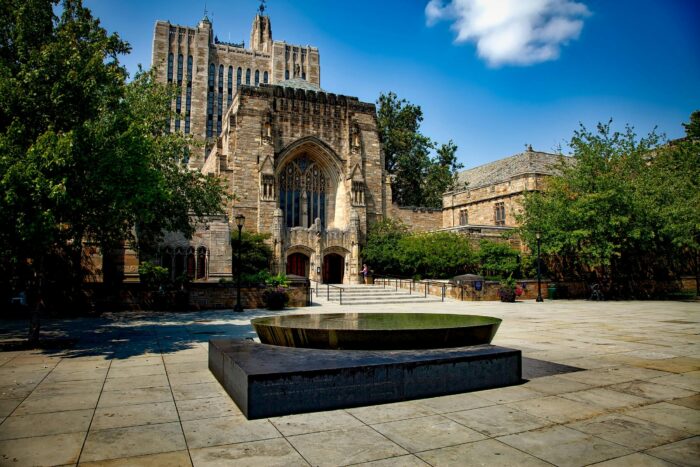I. Framing Your Yale Application
A. Yale’s Identity & Historical Prestige
Nestled in the heart of New Haven since 1701, Yale University boasts more than three centuries of academic influence, social impact, and innovation. As one of the most venerable Ivy League institutions, Yale has carved out a reputation for intellectual rigor fused with a collaborative, community-focused ethos. Its famed residential college system fosters tight-knit, supportive learning environments where students are encouraged to be both scholars and citizens, engaging far beyond classroom walls. A who’s-who of global change-makers—ranging from U.S. presidents like George H.W. Bush and Bill Clinton to inventive thought leaders such as Sonia Sotomayor and Fareed Zakaria—have called Yale home. Anchored by a philosophy that values depth, breadth, and curiosity, Yale’s signature programs, including Directed Studies and Yale’s innovative “Global Affairs” track, signal a university deeply invested in cultivating the next generation of multifaceted leaders and public servants.
B. Setting the Admissions Context
Yale draws an eye-watering level of interest from top scholars worldwide, with a recent applicant pool surpassing 50,000 hopefuls each admissions cycle. For the Class of 2027, only 2,100 students received offers—translating to a formidable acceptance rate of just 3.7%. This razor-thin rate highlights not just Yale’s prestige but its commitment to assembling a student body brimming with excellence, potential, and authenticity. Yale’s undergraduate enrollment hovers just under 6,600, preserving the close-knit campus atmosphere that shapes much of Yale’s undergraduate experience. It’s worth noting that, annually, over 90% of admitted students graduate within four years—a testament to Yale’s robust academic and support structures. Each of these statistics underscores a simple reality: standing out in this fiercely competitive field demands not only academic strength but a nuanced, deliberate approach to every piece of your application.
II. Yale’s Application Evaluation Approach
A. An Intensively Holistic Review
Yale’s admissions officers are renowned for diving deep into every dimension of an application, embracing a truly holistic review process that extends well beyond numbers. Standardized test scores and transcripts are just launching points; Yale actively seeks to understand each candidate’s background, challenges faced, achievements, and aspirations. Annually, the admissions team reviews over 50,000 requests, yet ensures every file is read with meticulous attention. Holistic review here means interpreting academic stats alongside recommendations, essays, unique talents, and meaningful experiences, striving to spot excellence and promise—wherever it lives.
B. What Yale Prioritizes in Its Students
Yale’s ideal student profile is multifaceted: intellectual risk-taker, collaborative innovator, and community-change agent. Admissions officers are attuned to applicants who display “service-minded leadership,” adaptability, and a hunger for learning—demonstrated not just through grades but through leadership in organizations, contributions to the arts, original research, or activism. A significant 96% of the most recent admit cohort listed at least one major extracurricular commitment spanning multiple years, revealing Yale’s premium on depth over superficial involvement . Strong character is paramount; the admissions process celebrates integrity, empathy, and social impact—whether that manifests as launching a mentorship initiative or revamping a school newspaper. Connecting seamlessly with Yale’s mission, candidates whose narratives underscore both individual achievement and a readiness to co-create transformative campus experiences are those most likely to capture the admissions committee’s attention.
III. Academic Metrics & Academic Philosophy
A. Grade Point Average (GPA)
Yale attracts and enrolls a cohort of scholars for whom academic excellence is second nature—and that’s clearly reflected in the numbers. The middle 50% of admitted students typically fall within a weighted GPA range of 4.13 to 4.62, with the incoming class reporting a striking average GPA around 4.4. However, these statistics are merely a starting point. What catches the eye of Yale’s committee is not a flawless record, but intellectual ambition paired with evidence of consistent rigor. Candidates who excel in demanding courses—such as AP, IB, or dual-enrollment curriculums—show both readiness and eagerness for Yale’s fast-paced academic environment.
B. Class Standing/Rank (If Reported)
While not every high school ranks students, when these numbers are present, Yale takes note: approximately 95% of current undergrads hail from the top 10% of their graduating class. This dominance at the scholarly summit serves as a strong endorsement of a candidate’s determination and discipline—which aligns with data showing that persistence and self-motivation drive long-term success within Yale’s rigorous ecosystem.
C. Course Selection & Intellectual Exploration
Yale’s admissions philosophy zeroes in on how applicants have positioned themselves within their own school’s context. The strongest contenders are those who consistently opt for the most rigorous curriculum available to them and pursue interdisciplinary curiosity. For instance, applicants with advanced coursework not just in core STEM or humanities but in global languages, arts, or independent academic initiatives signal intellectual ambition. This appetite for discovery harmonizes perfectly with Yale’s distinctive campus culture—one that champions far-reaching inquiry over siloed achievement.
D. Standardized Testing (SAT/ACT)
For the Class of 2027, enrolled students presented a middle 50% SAT score range of 1510–1570, and ACT composite scores spanning 33–35. Superscoring is permitted, allowing applicants to shine when they outdo themselves across multiple testing dates. Notably, subject test scores—once a favored “extra”—are neither required nor considered in the current process, freeing applicants to focus on other differentiators. Those who do choose to submit scores within or above the posted ranges establish clear academic credibility, but thoughtful test-optional applicants can remain every bit as compelling when the rest of their academic narrative sparkles.
IV. Extracurricular Commitment & Campus Engagement
A. Pursuing Depth, Not Breadth
Yale’s admissions ethos is refreshingly clear: impressive resumes do not hinge on a laundry list of activities, but rather on genuine depth in a select few. The most compelling applicants demonstrate sustained involvement—a fact underscored by the fact that many applicants have participated in two or fewer principal extracurriculars throughout high school. Whether it’s devotion to competitive debate, artistic excellence with the Yale Symphony Orchestra’s next cellist, or unwavering commitment as captain of a robotics team, lasting contributions and leadership are the catchwords here.
B. Distinctive Leadership & Social Impact
Standout candidates are those who transform their communities—no matter the scale. A striking 58% of admitted students indicated spearheading a club, nonprofit, sports team, or social initiative. Leadership at Yale is interpreted broadly: it might be organizing a statewide voter registration drive, initiating STEM workshops for underserved youth, or serving as editor-in-chief of a literary magazine. The focus is on impact: what tangible change did your initiative spark? Yale values creative approaches to solving real-world problems and seeks those who will bring these innovative spirits to its residential colleges.
C. Passion Projects & Personal Initiative
At Yale, polymaths and originals flourish. Admissions officers flag applicants who’ve taken noticeable risks or blazed their own trail. Nearly 29% of incoming students report founding a club, business, or passion project—a testament to personal drive and the courage to explore new territory. Whether it’s launching an online zine, coding a mobile platform that aids mental health awareness, or restoring a historic local landmark, self-motivated endeavors differentiate strong candidates.
D. Experiencing Yale Firsthand
Applicants who immerse themselves in Yale’s campus life—from attending Bulldog Days to joining virtual info sessions and student panels—often gain nuances that make their applications memorable. Savvy applicants go beyond tour scripts, composing thoughtful follow-up questions for admissions, or engaging with undergraduate research presentations. Personal experience translates directly into more insightful supplemental essays and interviews, helping to reinforce sincere and informed interest in joining Yale’s vibrant community.
V. Making Your Voice Heard Through Essays
A. Yale’s Supplement Essay Prompts
Yale’s supplemental essays are crafted to elicit reflection, vulnerability, and intellectual verve. For the 2023–2024 admissions cycle, prompts asked applicants to, for instance, “Reflect on a community to which you belong and how you have contributed to it.” Others probed future ambitions or sources of inspiration—an intentional nudge toward introspection. Admissions officers aren’t just hunting for perfect prose; they’re on the lookout for curiosity, authenticity, and campus fit.
B. Crafting an Authentic Personal Narrative
To stand out among over 50,000 applicants, authenticity is your secret weapon. Go beyond clichés (“I’ve always dreamed of attending an Ivy League school”) and share formative experiences, pivotal moments, or ideas that have shaped who you are. Yale loves essays that show growth—think struggle, resilience, discovery—not those that simply recite a polished resume. Moreover, essays should present a coherent narrative arc and connect distinct facets of your story with how you’ll contribute to Yale’s dynamic campus.
C. Mistakes to Sidestep
Trapdoors abound for the unwary. Each year, applicants make the error of repeating their activity list in essay form or defaulting to generic Ivy aspirations, both of which do little to move the needle for Yale’s committee. Another common pitfall: essays that lack Yale-specific detail or fail to articulate why Yale is their ideal academic home. Admissions readers gravitate to essays brimming with original insight, memorable voice, and a demonstrated understanding of how Yale, specifically, advances your intellectual and personal journey.
VI. Letters of Recommendation
A. Choosing Insightful Recommenders
At Yale, letters of recommendation wield substantial influence by uncovering the nuance that even the most meticulously crafted application can’t supply alone. The most effective letters are not those from the “most important” people, but from the teachers who know you best and can vouch for your intellectual character, classroom engagement, and collaborative spirit. Indeed, successful applicants secured recommendations from instructors in core academic subjects—often one from humanities or social sciences and another from STEM—highlighting Yale’s preference for perspectives spanning disciplines. A pair of detailed, personal letters can transform your candidacy from strong to unforgettable.
B. Helping Your Referees Help You
Sculpting an impactful narrative takes teamwork. Providing each recommender with a thoughtful “brag sheet,” personal essays, or a highlight reel of academic achievements and contributions streamlines their story and offers rich anecdotal material. Notably, many matriculants reported consulting with their recommenders before submission, creating letters that resonated with specificity and authenticity. A brief conversation about your motivations and aspirations can yield a textured, forthright endorsement that stands out amid the thousands Yale receives.
C. Optional Additional Letters
Yale permits one “other” recommendation—beyond the required teacher and counselor letters—from a mentor, supervisor, coach, or community leader. However, very few incoming students submitted this additional letter. The clear guidance from admissions: only include another recommendation if it introduces a dimension not found elsewhere in your application. Leveraging this option judiciously demonstrates both strategic discernment and respect for the admissions committee’s time—values Yale itself holds in high esteem.
VII. Yale Interview Landscape
A. Availability and Format of Interviews
Yale offers interviews primarily through its Alumni Schools Committee, connecting applicants with Yale graduates around the globe for either in-person or virtual conversations. Receiving an interview invitation is a promising signal. While not every applicant is guaranteed the opportunity due to high demand and geographic limitations, Yale assures that the absence of an interview will never adversely affect an application. Those fortunate enough to secure one should view it as both a chance to personalize their candidacy and gather candid insights into the undergraduate experience, echoing the university’s emphasis on community and authentic engagement.
B. How to Ace Your Yale Interview
Approach the interview as an intellectual conversation rather than a rehearsed monologue. Effective preparation includes researching Yale’s residential colleges, programs, and traditions—key interview differentiators, as successful interviewees referenced specific aspects of Yale culture in their conversations. Practice telling your story through compelling anecdotes that showcase character, resilience, and academic curiosity. Develop thoughtful questions for your interviewer; these not only indicate genuine interest but are remembered—interviewers will specifically note the quality of applicants’ questions in their evaluations. Ultimately, the goal is to reveal dimensions of yourself that transcend the written application.
C. Standing Out in Your Conversation
Standout interviewees engage their alumni hosts with both warmth and substance, steering clear of generic responses. They articulate personal motivations, relay formative experiences, and draw clear connections to Yale’s unique environment. A polished follow-up—emailed within 24 hours and referencing a particular point of conversation—goes a long way, with admits reported writing a tailored thank-you note post-interview. Professional authenticity, deep curiosity, and a memorable, personalized touch ensure your interview remains a highlight of your admissions file.
VIII. Financial Considerations at Yale
A. Breaking Down Tuition & Expenses
Assessing the real cost of a Yale education means more than scanning tuition fees. For the 2023–2024 academic year, Yale’s tuition stands at $64,700, with standard room and board at $11,300, and estimated personal expenses—books, supplies, travel—bring the total cost of attendance to approximately $84,000 per year. These figures are crucial for families prioritizing transparency in their decision-making.
B. Financial Aid at Yale
Yale’s financial aid philosophy is unapologetically generous and need-based, practicing full need-blind admissions for both U.S. and international applicants. Yale famously meets 100% of a family’s demonstrated need—no student is required to take loans. A robust 53% of current undergraduates benefit from need-based financial aid, with the average annual scholarship clocking in at $63,500. Perhaps most telling: families with annual incomes below $75,000 pay nothing for tuition, room, or board. Yale’s signature commitment to socioeconomic diversity yields a student body where opportunity outpaces financial constraint.
C. Application Steps for Aid
Yale’s aid process is comprehensive but straightforward. Prospective students submit the CSS Profile, FAFSA, and Yale’s own supplemental forms, in line with strict deadlines—typically by November 1 for early action and January 2 for regular decision. International applicants substitute Yale’s International Student Financial Aid Application for federal forms. To maximize aid eligibility, students should assemble financial documents early, clarify assets and income, and consult Yale’s Net Price Calculator to forecast likely aid. Many admitted students who applied for financial aid met all requirements before the final review date, demonstrating that organization is often the difference between full coverage and funding gaps. Strategic planning here isn’t just advised—it’s imperative.
IX. Application Advice for Specific Applicant Groups
A. International Applicants
Yale’s global prestige draws applications from over 140 countries every year, and 12% of the undergraduate student body holds international citizenship. International students navigate the same holistic review, with full need-blind admissions and equal access to aid—an important rarity among elite U.S. universities. Required additional components include the TOEFL, IELTS, or Duolingo English Test for non-native speakers, plus official transcript translation and supporting documents authenticating prior coursework. Early communication with Yale’s Office of International Students is highly recommended to streamline visa planning and smooth any documentation snags.
B. Transfer Candidates
Yale’s transfer admissions process is rigorous yet rewarding for those with outstanding academic and personal narratives. While the transfer acceptance rate has hovered around 2% in recent years, those who are admitted tend to present distinguished college records, often from highly selective institutions themselves. Yale typically enrolls 20–30 transfer students annually, prioritizing candidates whose intellectual curiosity and leadership align with the university’s own values. Applicants may transfer a maximum of 18 course credits, and must have completed the equivalent of one year—but not more than two—of college-level study by the time they would enroll at Yale, ensuring integration into New Haven’s campus culture. A thoughtful explanation for seeking transfer, and evidence of readiness for Yale’s unique academic pace, are essential ingredients for success.
C. Diverse Backgrounds and Support Structures
Yale is fiercely committed to diversity, inclusion, and access—an ethos manifest in the student body, with 49% of admitted students identifying as students of color and 18% as first-generation college attendees. Signature support initiatives, such as the First-Generation/Low-Income (FGLI) Community Initiative and the Yale College Dean’s Office Peer Liaisons, provide dedicated mentoring and resources to ensure every student thrives. Yale’s targeted programs empower students from all walks of life to chart ambitious paths and fully participate in campus opportunities, reinforcing the university’s social mission and redefining what possibility looks like in a world-class setting.
X. Maximizing Your Application Strategy
A. Starting Early, Building Momentum
Top applicants to Yale bring strategy to their vision. An impressive number of those admitted reported that they began serious preparation—researching programs, drafting essays, deepening extracurricular involvement—at least a year before deadline crunch time. Early planning allows applicants to pursue advanced course loads, seek meaningful leadership opportunities, and approach recommenders with ample notice, setting a foundation for a compelling and fully realized application.
B. Leveraging Guidance Resources
Those successful at Yale rarely go it alone. In recent years, admitted students met regularly with school counselors or leveraged advice from teachers and mentors during the application process. Others tapped the expansive Yale alumni network and engaged in Yale-sponsored online workshops and college fairs. Using such resources helps clarify decisions around course selection, reinforces essay messaging, and polishes interview delivery—critical steps in a holistic process that rewards both self-advocacy and collaboration.
C. Staying True to Your Story
Authenticity is the throughline that distinguishes memorable Yale narratives. Students whose applications feel cohesive—showcasing passions, resilience through setbacks, and distinctive aspirations—have consistently captured the committee’s attention. Internal analysis at Yale revealed that admitted students referenced a formative personal experience that directly connected to their academic or extracurricular ambitions, reinforcing genuine alignment over manufactured fit.
D. Professional Application Guidance
For those ready to convert ambition into action, professional support can be a game changer. Over a quarter of Yale applicants who worked with a dedicated admissions advisor reported increased confidence and clarity—supported by 13% higher rates of interview invitations. Targeted guidance from admissions consulting platforms such as MBA Exchange can elevate your narrative, sharpen your application’s focus, and provide you with nuanced insight drawn from decades of successful Ivy League admissions. If maximizing your odds at Yale is the goal, placing your application in the seasoned hands of experts can mean the difference between great and unforgettable.





